NICE have published new guidelines on postnatal care. The committee responded to comments from stakeholders, including from us. Our comments and the responses from NICE can be found in this document, starting from page 114. Here is why we have said on Twitter that some guidelines are #NotNICENotEvidenceBased.
We highlighted grave concerns as parents whose babies experienced complications where exclusive breastfeeding was a significant contributing factor, including excessive weight loss, faltering growth, jaundice and hypernatremic dehydration. We told them hospital readmissions for feeding related complications are common. We said that we know of only one strategy demonstrated in randomised controlled trials to prevent readmissions: limited supplementation of breastfeeding with formula. Did the committee deem this important enough to even review? No.
#NotNICENotEvidenceBased.
We were pleased to see the committee acknowledge that combination feeding is possible. However, they continue to refuse to offer this as a possible solution to feeding related problems, or to present it as an option to parents who are concerned about their baby’s breastmilk intake. Why?
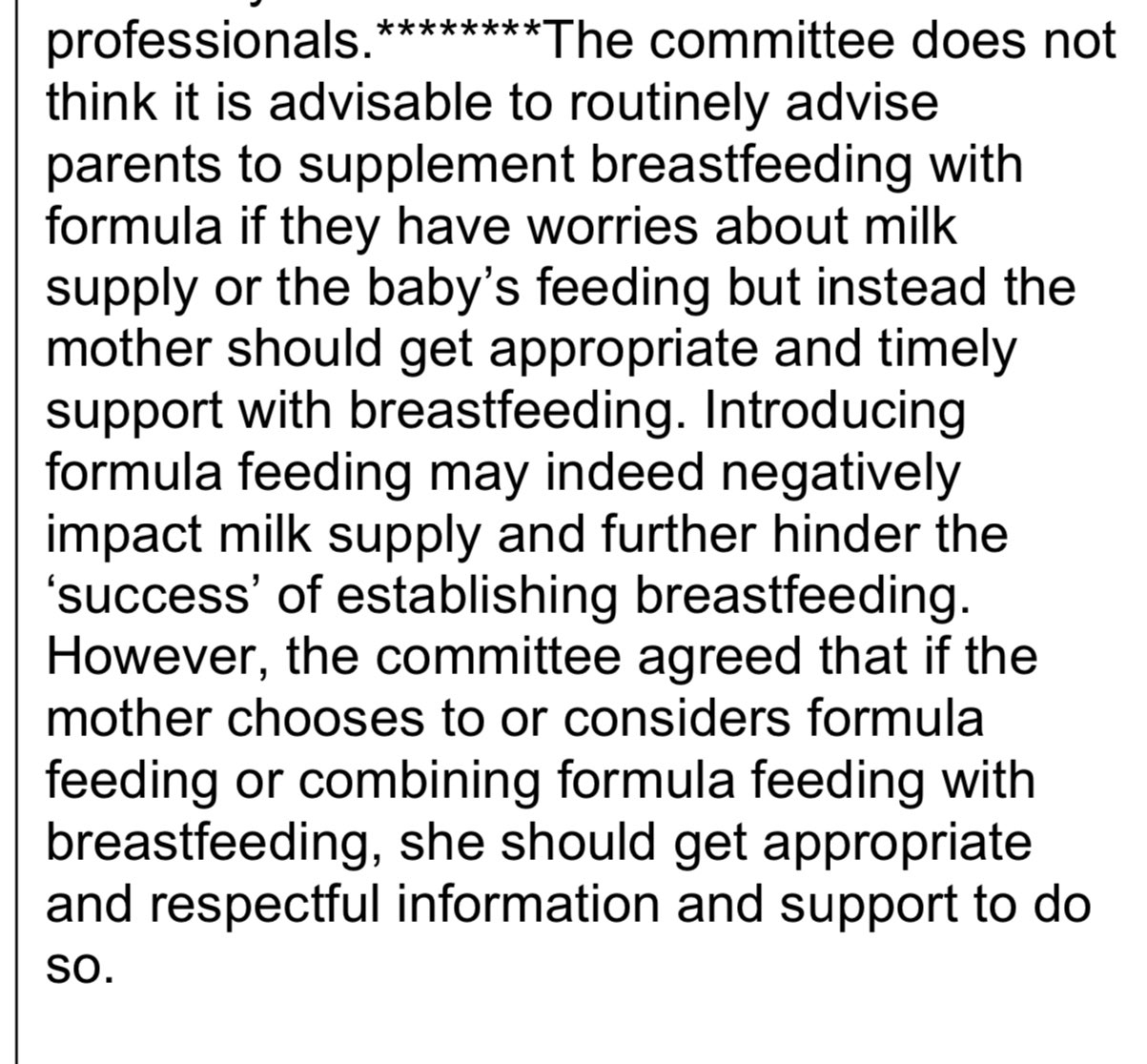
So, no guidance on how to supplement and sustain breastfeeding – perhaps our friends at the Fed is Best Foundation could help?
Why are they so confident that supplementation hinders breastfeeding? Trials suggest limited early supplementation does not hinder breastfeeding. Observational data has found that up to 4oz formula a day in addition to breastmilk is not associated with stopping breastfeeding earlier. Also, why are they so confident that supplementary feeding is not commonly clinically indicated, when they didn’t review the evidence on this? #NotNICENotEvidenceBased.

They endorse the Baby Friendly Initiative’s feeding observation schedules but they don’t review evidence as to whether or not these adequately detect feeding difficulties, especially insufficient milk intake. We had a look and what did we find? No evidence! #NotNICENotEvidenceBased.
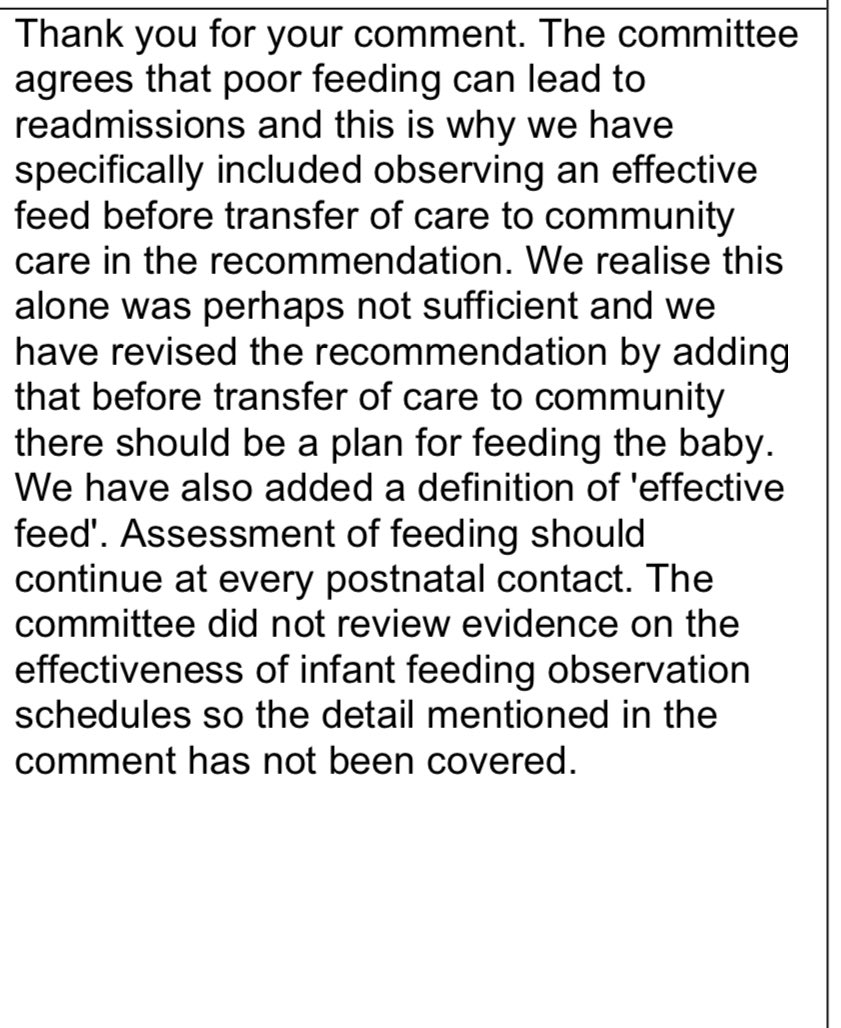
The definition of effective feed includes no mention of how to ensure actual milk intake or identify early signs of insufficient intake. This is not reassuring to us! We were told our babies were feeding well, only to be readmitted to hospital as a result of under-feeding just hours later.

In any other context, would it be acceptable to say food is indicated only when a person is showing signs of serious undernutrition? If a baby shows signs of hunger (e.g. overly frequent feeding and excessive sleepiness) then surely responsive feeding is to feed them?
And of course there are other reasons families might want to mixed feed, such as sharing responsibilities, taking the pressure off, giving both parents the chance to get adequate sleep at night or to give the lactating parent time to attend to other things. Our families, our decision!
The NICE committee’s own review of the evidence found that parents wanted information about all feeding methods, regardless of their feeding intention. They conclude this is ‘not feasible’. They only recommend discussing formula with those considering using it. Newsflash: the majority of parents who intend to exclusively breastfeed will use formula at some point. Get over it and make sure we are prepared to do so confidently and safely! #NotNICENotEvidenceBased.
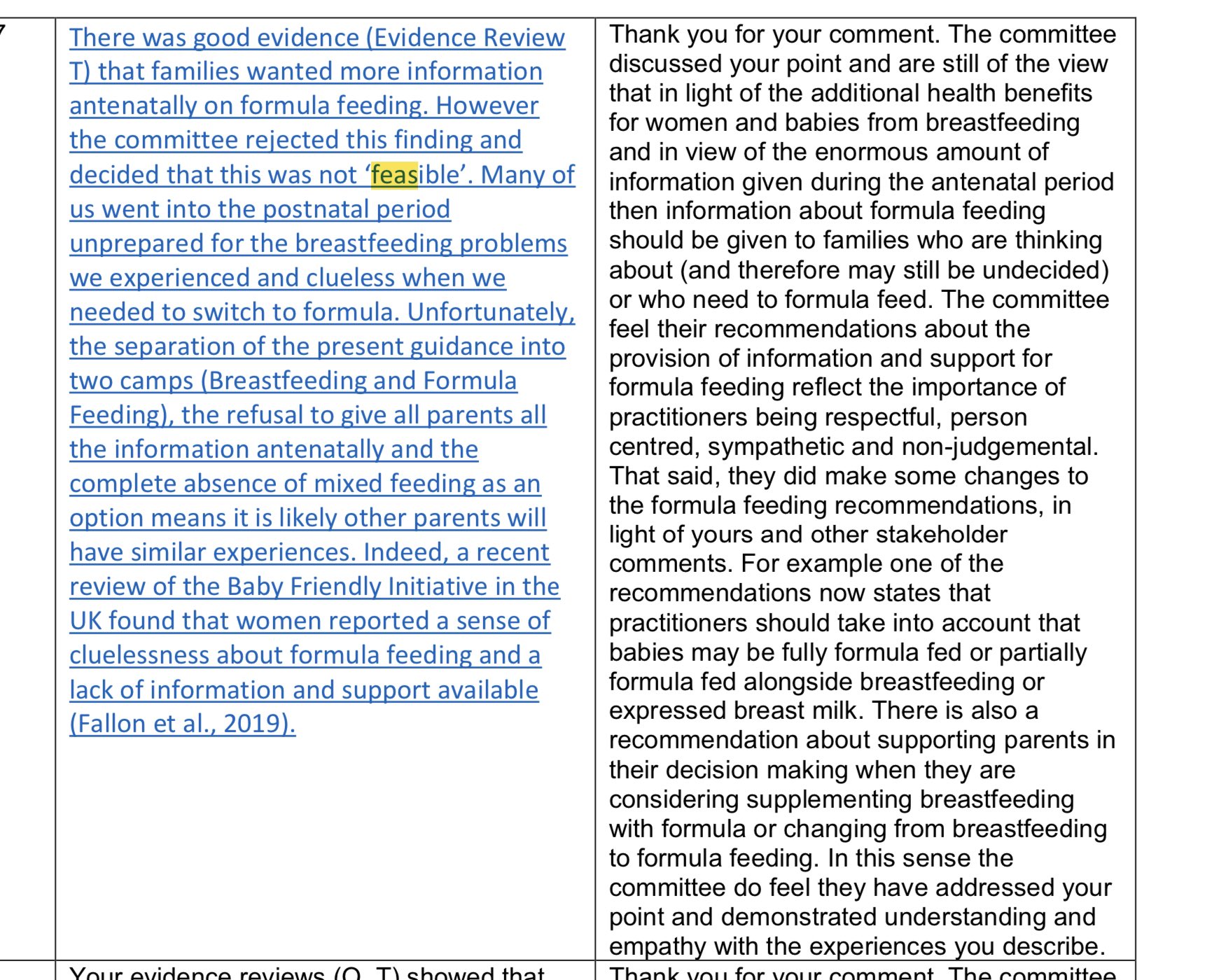
We were relieved to see that an original suggestion (we kid you not– this was actually proposed) that breastfeeding success could help improve women’s self-esteem was removed. The committee made no attempt to defend themselves.
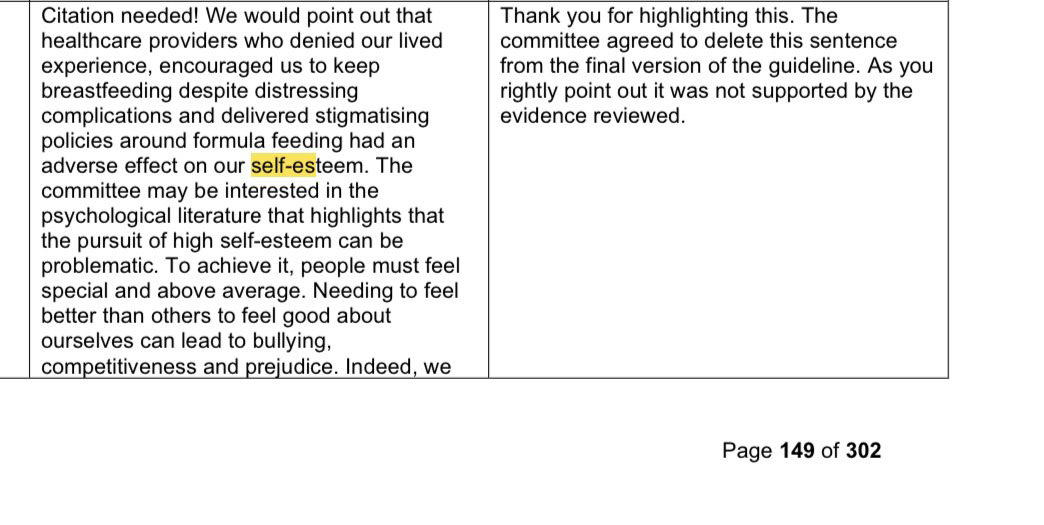 But they don’t constrain themselves to evidence when it comes to bonding. They are very keen on skin-to-skin to promote bonding, especially for babies who are being formula fed. Evidence in their review that skin-to-skin improves bonding, attachment or parent-child relationships? None! They’re also insistent that the number of people feeding a baby should be ‘kept to a minimum’. Evidence in their review that this improves any outcome: also none! #NotNICENotEvidenceBased.
But they don’t constrain themselves to evidence when it comes to bonding. They are very keen on skin-to-skin to promote bonding, especially for babies who are being formula fed. Evidence in their review that skin-to-skin improves bonding, attachment or parent-child relationships? None! They’re also insistent that the number of people feeding a baby should be ‘kept to a minimum’. Evidence in their review that this improves any outcome: also none! #NotNICENotEvidenceBased.
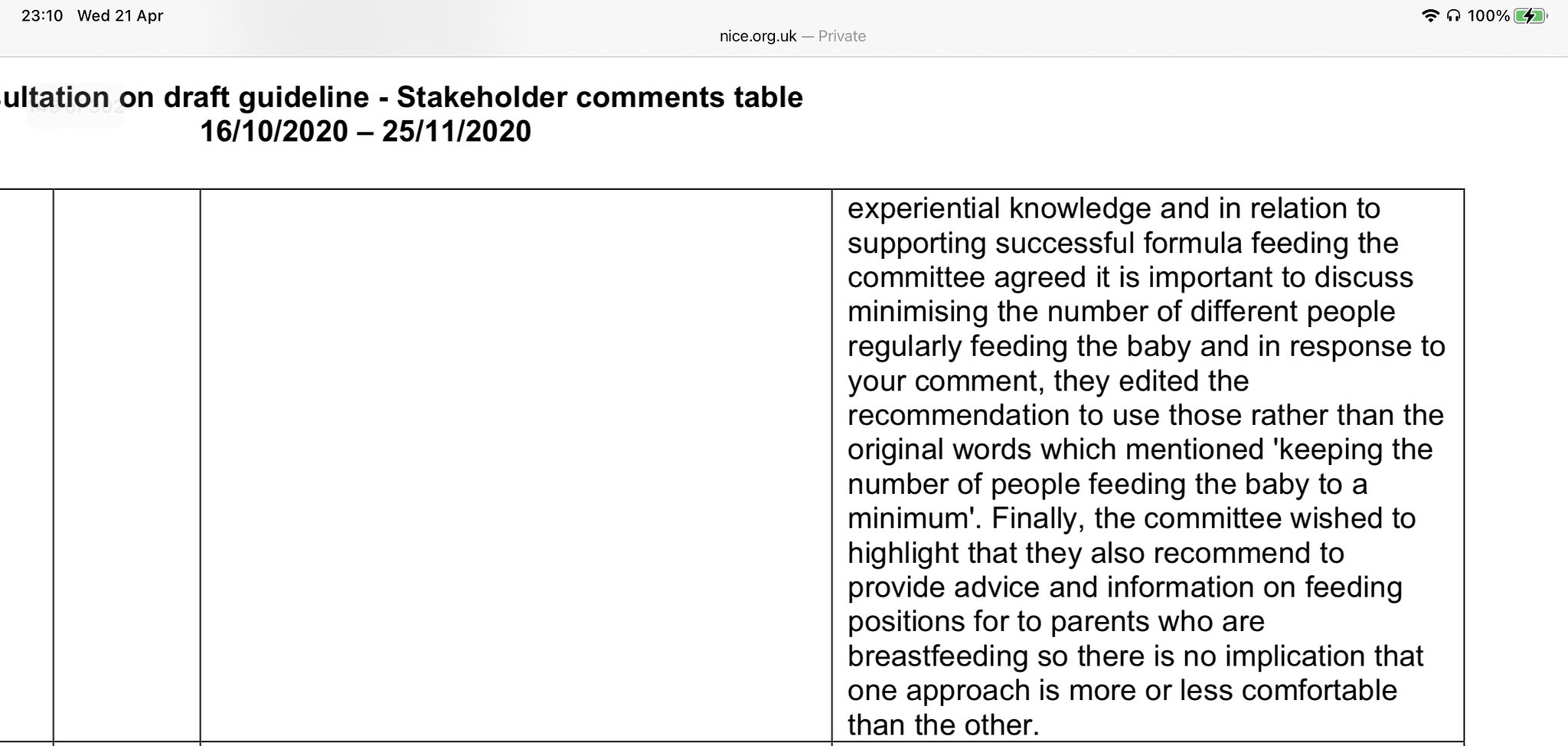
This isn’t about improving health outcomes, ensuring babies are safely fed or that parents’ physical and psychological needs are attended to. This is healthcare providers telling us how to conduct our family life. And they are confused about why this comes across as intrusive.
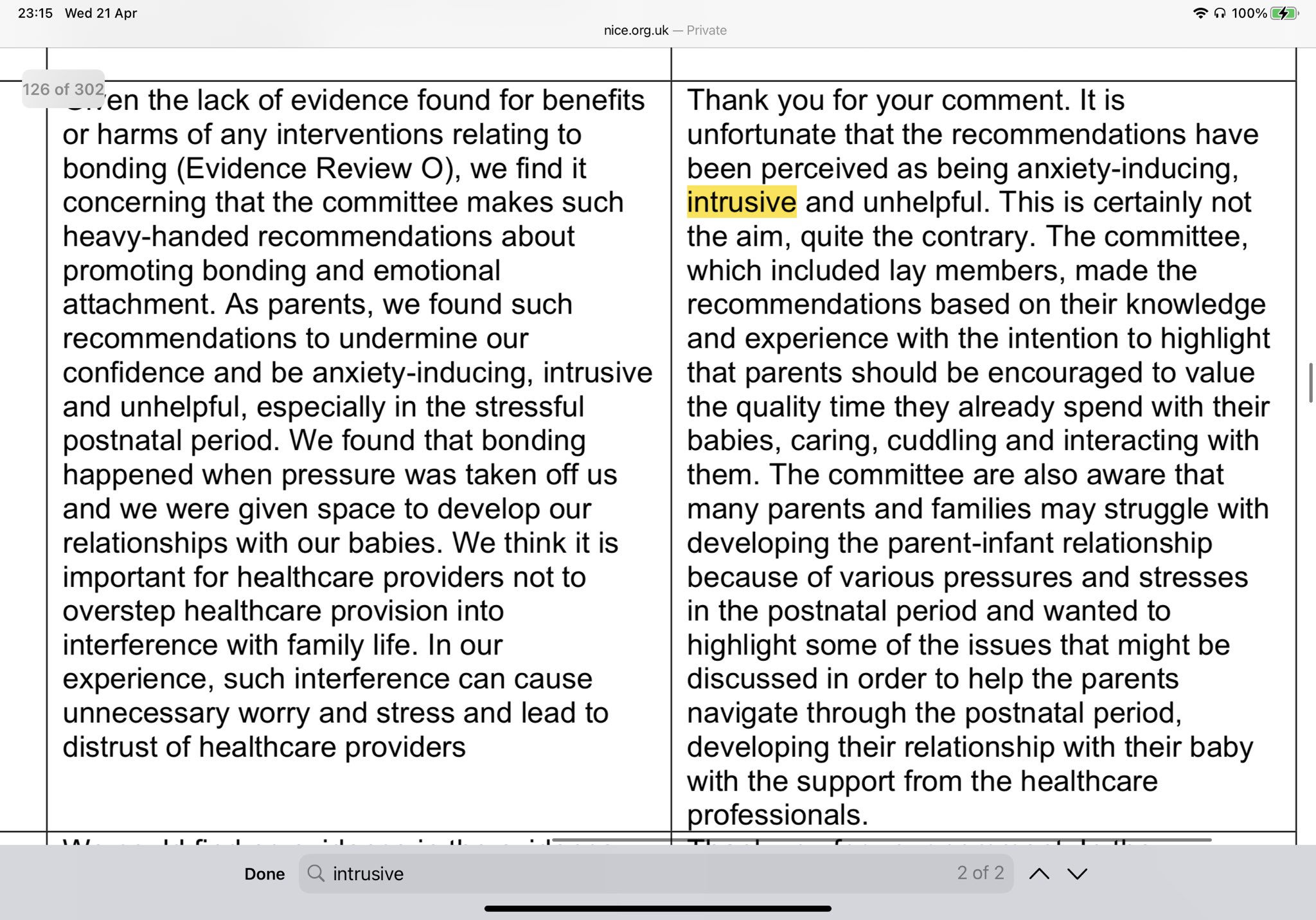
We were very interested to read BABCP’s (British Association for Behavioural and Cognitive Psychotherapies) comment on perfectionistic expectations about bonding. Can anyone else see how advice to exclusively breastfeed, have lots of skin-to-skin, be constantly responsive to baby’s cues and limit the number of people who feed the baby might contribute here?
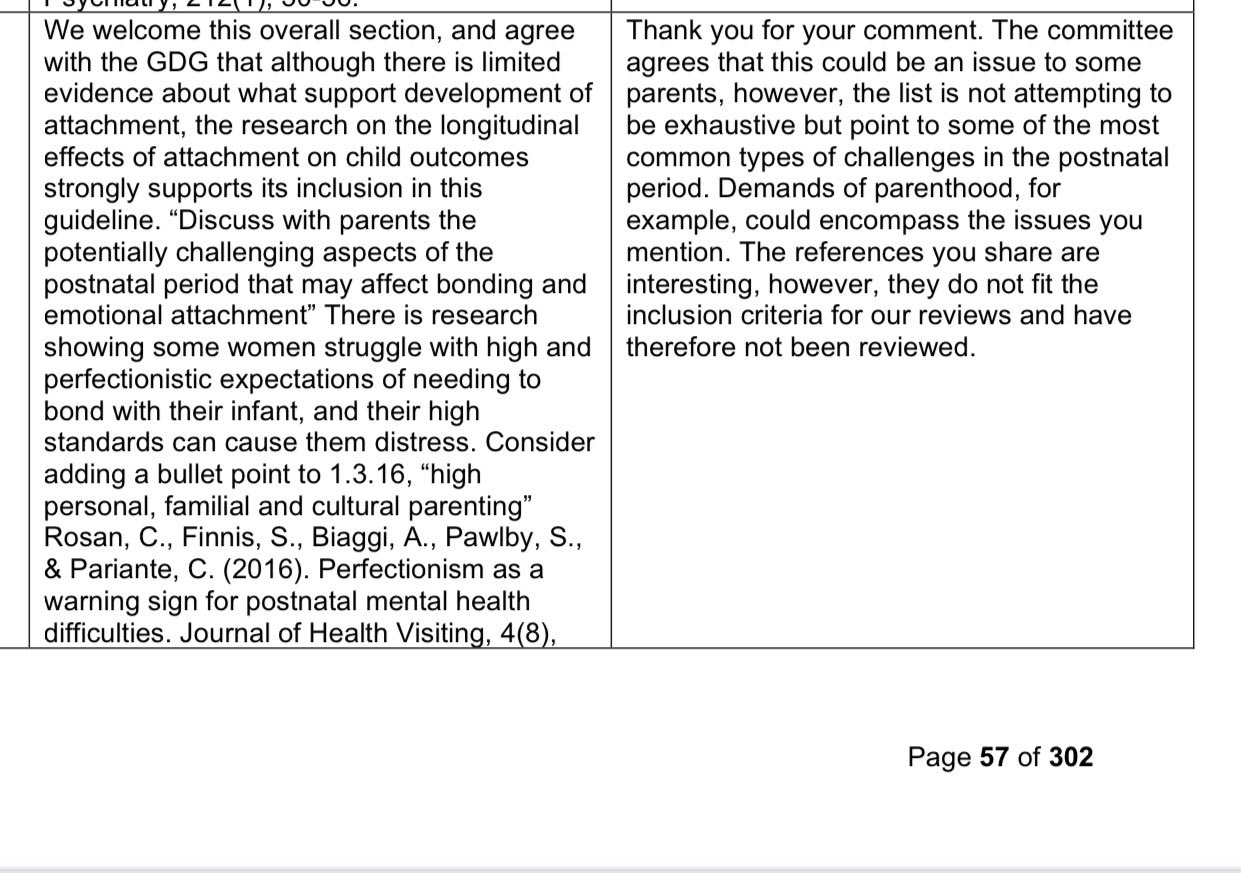
The committee don’t really address that, but given that they are so keen to ‘help’ us navigate the early postnatal period and our relationship with our baby, why didn’t they review any research on developing attachment security? If they had, they would have realised that a key concept in attachment science is the idea of ‘good enough parenting’. Parents whose children are securely attached to them are attuned and responsive about 20–30% of the time – old paper but classic. They might have discovered that experts in attachment, like the cognitive behavioural therapists at the BABCP, emphasise that perfection is neither achievable nor desirable. Knowing this, is there a need for prescriptive suggestions or advice here? #NotNICENotEvidenceBased.
They justify making these recommendations on the basis of the committee’s expertise. OK, here’s the committee list. Where is the attachment expertise? Any social workers or psychologists who conduct specialist assessments of parent-infant attachment or interventions for attachment difficulties? Maybe the perinatal psychiatrist?
Perhaps the best advice would be to meet your baby’s needs, to keep them clean and fed, to enjoy them and to make your own self-care a priority (because who among us is at our best, most responsive self in any of our relationships when we are neglecting our own needs?) and relax.
- Don’t address clinical safety issues around ensuring adequate milk intake
- Ignore evidence that parents want to discuss all feeding options
- Refuse to present all options to all parents
- Dish out advice about how to conduct family life.
#NotNICENotEvidenceBased!
This blog was adapted from a thread on Twitter.

